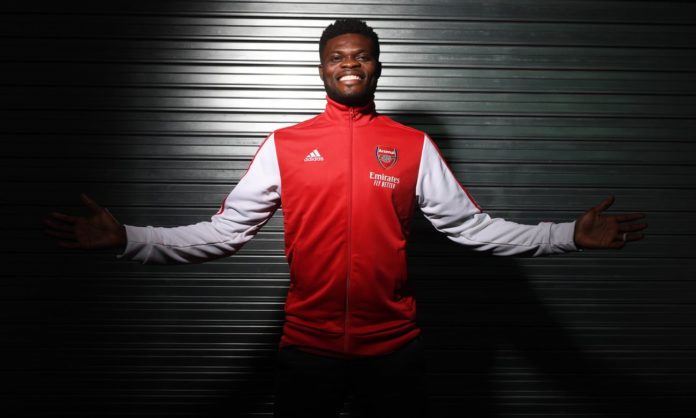
The eight-legged tattoo on Thomas Partey’s arm recalls a time when his gifts drew an unusual comparison. “I always say, if I would be an animal, I would be an octopus,” he says. “I remember when I was in Almería they called me ‘the octopus’ because I stole a lot of balls.”
He is referring to the tenacious attributes that ultimately brought him to global prominence. It was during that spell at Almería, on a season-long loan from Atlético Madrid in 2014-15, that Arsenal’s scouts first got their tentacles into Partey. Now he is sitting inside their training ground and it has felt like a long time coming, given Arsenal agreed terms with his representatives in early 2019. The assumption until around lunchtime on transfer deadline day was that all involved would have to wait even longer, but then Arsenal dramatically agreed to meet Partey’s £45m release clause at Atlético and the hype machine roared into overdrive.
“I wasn’t here but I felt like I was already here, so for me, it was a great feeling,” the softly spoken Partey says of the reaction to his move. Since then there has been little let-up: a farewell visit to Atlético’s training ground was followed by appearances for Ghana against Mali and Qatar. The latter of those, a 5-1 win on Monday, brought two assists for Partey but he has been enlisted primarily for those cephalopodic qualities.
“Everything is possible,” he says when asked whether he can fulfil Arsenal’s seemingly interminable requirement for a world-class holding midfielder. “I know I am not going to give up even if [in] bad situations I need to work hard. I have been there, I have been in situations like that. Now I think I know that working hard and giving all of my best in every game will determine if I live up to [the fans’] high expectations.”
In paying that release fee upfront, Arsenal have placed a huge bet on Partey in financially straitened times. To put it in context, the Guardian understands only £5m of the £23.5m basic fee they agreed with Lille for the services of Gabriel Magalhães in August was paid straight up, with the rest spread over three years. It is easy to see Partey as the flagship signing for Mikel Arteta’s reign but he plays down the suggestion he will be under added scrutiny.
“I think there is no pressure on me. I like to challenge myself, I like new challenges. It’s all about learning fast, learning quickly.”
Partey has had to do plenty of that. His move to Spain in 2011 arose in clandestine circumstances, his family only belatedly realising he had departed, and Madrid felt far from the comforts of Odumase Krobo, his home town. “It was difficult, it was different,” he says of those early days. “It was cold and I was not used to that. I had to change my mind, change my mentality, my way of thinking.”
READ ALSO
The self-belief that brought him to Atlético was hewn in the hills of eastern Ghana. Partey, one of eight siblings, would watch Premier League and La Liga games with his father, Jacob, who was a talented amateur player and would take his son with him on training runs.
“For him, it is a great feeling for me to achieve my dream,” he says. “It was always about football. He was advising us about that and also to go to school. He would go out with us in the early mornings to run to the mountains. We would be jumping, heading leaves and all those things. He was my first coach.”
He knows the hardships involved in starting at the bottom and it is part of the reason that, along with his agent Jose Jiménez and two others, he bought a stake in the Spanish fourth-tier side Alcobendas Sport last year. In April he stepped in to pay the players’ wages so that they were not obliged to seek state support during the Covid-19 crisis.
“We knew if we didn’t pay them they would have nowhere to go,” he says. “They could not depend on anyone. They are playing in our team, so we had to take care of their wages. We had to help them take care of their families.”






